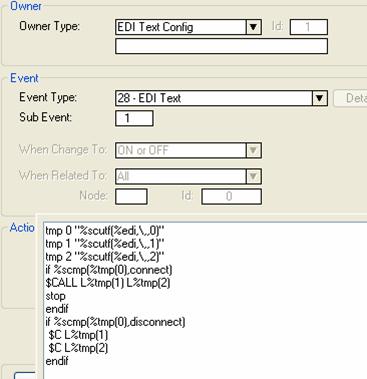Difference between revisions of "External Data Input"
From Zenitel Wiki
(→Additional information) |
(→Additional information) |
||
| Line 36: | Line 36: | ||
:* [[%tmp]] - Read temporary variable | :* [[%tmp]] - Read temporary variable | ||
| − | * '''Note''': The NUL character (ASCII 0x00) cannot be used. | + | * '''Note''': The NUL character (ASCII 0x00) cannot be used in the EDI string. The processing of the string will be terminated when receiving NUL. |
== Example == | == Example == | ||
Revision as of 12:27, 14 May 2014
The EDI ports are defined in AlphaPro: Exchange & System -> Serial Ports.
- The input message must have a termination character
- Maximum 128 characters
- Parsing the content is done in the action string in the Event Handler
Event description
| Event Owner: | EDI Text Config |
| Event type: | 28 - External Data Input |
| Subevent: | 1 – 4: specifies which EDI port 0: matches all ports |
| When change to ON: | When valid data is received on EDI port |
| When change to OFF: | N/A |
| When related to: | N/A |
Additional information
- Context parameters
- Useful macros and statements
- Note: The NUL character (ASCII 0x00) cannot be used in the EDI string. The processing of the string will be terminated when receiving NUL.
Example
The rule below will allow you to issue commands to EDI port like this:
- Input command on EDI serial port: connect,101,103
- - Generates internal command $CALL L101 L103
- Input command on EDI serial port: disconnect,101,103
- - Generates internal commands $C L101
tmp 0 "%scutf(%edi,\,,0)" tmp 1 "%scutf(%edi,\,,1)" tmp 2 "%scutf(%edi,\,,2)" if %scmp(%tmp(0),connect) $CALL L%tmp(1) L%tmp(2) stop endif if %scmp(%tmp(0),disconnect) $C L%tmp(1) endif

